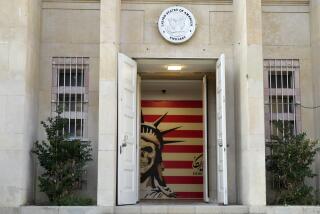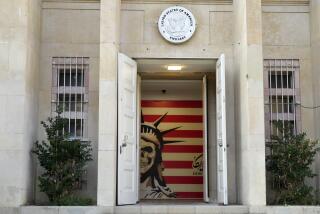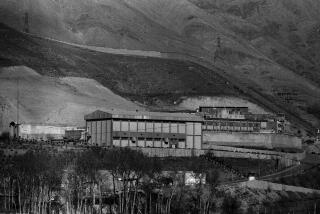A 444-day crisis
- Share via
Every life has significant dates, and for Mark Bowden, one of those was Nov. 4, 1979.
It was his first day as a reporter at the Philadelphia Inquirer after several years at the now-defunct Baltimore News-American.
It was also the day Islamist students stormed the U.S. Embassy in Iran and took 66 hostages, beginning a 444-day struggle between Tehran and Washington, D.C.
Every newsroom in the land was abuzz with the seemingly unbelievable story of U.S. diplomats held at gunpoint by young revolutionaries frenzied with religious absolutism and hatred of America.
Bowden’s thesis -- developed many years later -- is that the maddening complexities of the future were played out there in the captured compound and the streets crowded with anti-American demonstrators.
The U.S., possessor of enormous military and economic power, was stymied. The Europeans declined to be of much help. Fanaticism seemed triumphant.
The hostage crisis undermined the secular moderates in Tehran and strengthened the hand of Ayatollah Ruhollah Khomeini and the other mullahs. The secularists dared not seek an end to the situation lest they be labeled American stooges.
“It was the first conflict in the modern times with this notion of the United States as a Great Satan and that Allah is the only true path,” Bowden said. “Now, that’s become the defining struggle of the 21st century.”
But it wasn’t until after the Sept. 11 terrorist attacks and some intervening projects -- including his successful newspaper series and book “Black Hawk Down: A Story of Modern War,” about the fight in 1993 between U.S. soldiers and militiamen in the streets of Mogadishu, Somalia -- that he felt an overwhelming desire to look back at the 16-month standoff.
The result is “Guests of the Ayatollah: The First Battle in America’s War With Militant Islam,” published this past spring to solid if not rave reviews. And now, with his son Aaron, Bowden has turned “Guests” into a multipart documentary for Discovery Times Channel airing tonight and Tuesday, with news footage, interviews and dramatic re-creations.
There had been other books on the topic, but none had satisfied Bowden’s desire for a comprehensive look. “Nobody had pulled all these pieces together,” said Bowden, 54, during a recent stop in San Diego. “It was a challenge that excited me: to report the hell out of this thing and try to put it all together.”
To those familiar with his style, it is classic Bowden: prodigiously reported (680 pages) and written in a direct, aggressive style but without the curlicues or hype that sometimes passes for “stylish” journalistic writing.
The documentary is a top-notch mix of news footage of the takeover, interviews with former hostages and hostage-takers and, when necessary, re-creations. Bowden serves as narrator. The effort brings back the shock and chaos of the takeover, the frantic attempt to destroy sensitive documents and then the long agony of captivity.
Some images are iconic: Khomeini’s angry visage, the blindfolded Americans, the U.S. flag being used to carry out garbage. The pacing is swift, but the presentation is thoughtful and complete.
For three decades, the shah had been a reliable American ally in the Cold War, and when he was toppled, the Islamists turned their anger at the U.S.
“I remember people used to say, ‘We have dealt with the shah, and the U.S. is next,’ ” a hostage-taker tells the camera.
Some suspect one of the student leaders of the takeover may have been Mahmoud Ahmadinejad, now Iran’s bellicose president, who seems to delight in taunting the West with talk of nuclear weapons and the imminent destruction of Israel. Ahmadinejad has denied that he took part in the takeover.
To Bowden’s annoyance, Ahmadinejad and then-President Jimmy Carter refused to be interviewed for “Guests.” Bowden traveled to Tehran and worked through intermediaries in the Iranian government, but to no avail. He spent time with former Carter press secretary Jody Powell, who offered to help with his former boss. Carter still said no.
Of Ahmadinejad, Bowden is withering: “He’s a full-bore fanatic. He is a pure idealist, an arrogant religious fanatic. He has been from his youth, and it’s served him well.”
For Carter, he has respect. “Guests” does not entirely upend the common opinion of Carter as a man uncomfortable with military action and unable to get the loyalty of his top advisors. Carter insisted that the daring effort to pluck American hostages from a well-guarded compound in the middle of a crowded metropolis use rubber bullets; his secretary of state, Cyrus Vance, quit over the failed rescue attempt.
Still, Bowden stresses that all the hostages came home alive, as a result of negotiations, and he attributes that to Carter’s steadfastness in making their safety his top priority rather than striking back militarily.
“He was put in an impossible position: He had no good options,” Bowden said.
Although the book deals in detail with the hostages and the hostage-takers, its heart remains the rescue attempt, thwarted by unpredictable events (a busload of Iranian workers stumbled onto the U.S. rally spot in the middle of the desert), bad weather and terrible luck.
Bowden understands the psychology of brave men attempting the impossible; he also understands how inter-service rivalry can hamper any military mission. “The complexity of the mission strains credulity that it could have ever worked,” he said. “It shows how desperate they were.”
His reporting shows him that Iran is repeating a pattern: A manufactured confrontation with the U.S. is leveraging the mullahs into power and suppressing the secularists.
“The mullahs are an endangered species” without the U.S. as a boogeyman, Bowden said.
His next project keeps him on similar terrain -- he’s working on a screenplay about “extraordinary rendition,” the CIA’s strategy of hiding terrorism suspects around the globe while they are interrogated and unprotected by U.S. laws that ban torture.
After that, Bowden’s not sure what’s next. There is teaching at his alma mater, Loyola College in Maryland. And decades of journalism have taught one thing: You never know when a routine day is going to lead to something extraordinary.
*
‘Guests of the Ayatollah’
Where: Discovery Times Channel
When: 8 to 10 p.m. today and Tuesday
Ratings: TV-PG (may be unsuitable for young children)
More to Read
Sign up for Essential California
The most important California stories and recommendations in your inbox every morning.
You may occasionally receive promotional content from the Los Angeles Times.













